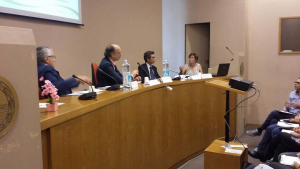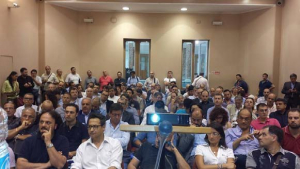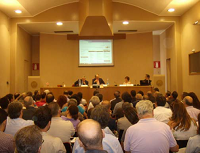Naples, March 27 2014 – As EnergyMed, the international fair on renewable sources and energy efficiency in the Mediterranean opens its doors, WWF and the SHAAMS project partners call on governments and decision makers to move faster towards the use of renewable sources and in particular solar energy. During 3 days in Naples, the conservation organization and partners will present the first results of an expert study looking particularly at the situation of solar, mainly photovoltaic, in Jordan, Lebanon and Egypt, taking advantage of the presence of Thomas Stocker, member of the International Panel on Climate Change (IPCC) and an adviser for the United Nations.Naples, March 27 2014 – As EnergyMed, the international fair on renewable sources and energy efficiency in the Mediterranean opens its doors, WWF and the SHAAMS project partners call on governments and decision makers to move faster towards the use of renewable sources and in particular solar energy. During 3 days in Naples, the conservation organization and partners will present the first results of an expert study looking particularly at the situation of solar, mainly photovoltaic, in Jordan, Lebanon and Egypt, taking advantage of the presence of Thomas Stocker, member of the International Panel on Climate Change (IPCC) and an adviser for the United Nations.
“A low-carbon economy based on renewable energy and energy savings is of primary interest to Mediterranean countries. The Mediterranean Sea is a closed basin, so any accident in oil and gas drilling poses serious risks not only for the environment, but also for the main economic resources of the region, from tourism to fisheries; the same happens with pollution coming from coal and oil power plants. But the Mediterranean is rich, rich in sun and wind, the treasures which we have free use of. Green economy sectors have resisted the economic crisis better than any other traditional sector, and green jobs are the only credible answer to the job crisis, considering that efficiency and renewable are more labor intensive”, said Mariagrazia Midulla, Head of Climate and Energy at WWF Italy.

SHAAMS is an EU-funded project, of which Berytech is a partner in this project, handling the communication plan and WWF is part, facilitating the take up of solar technologies in the Mediterranean. A recent study developed in the framework of the project shows that Lebanon and Jordan are still very dependent on fossil energy imports (more than 95%). In addition, most of their electricity is produced with heavy oil and diesel oil. Egypt’s energy situation is precarious due to the current or expected decline of domestic oil and natural gas resources, according to most experts and studies. Growing energy consumption and growing energy prices are increasing the financial pressure.
A transition to alternative energy resources, including renewable, will be a matter of necessity sooner or later. Egypt, Jordan and Lebanon’s renewable energy resources are enormous.
The potential for photovoltaic energy in Lebanon could reach up to 110 GW, almost 15 times the current generation from the thermal power plants of the country. In Jordan, renewable energy resources — particularly solar — could technically provide sixty times Jordan’s electricity consumption in 2050. Egypt has very favorable solar resources for a variety of solar energy technologies and applications. Both the Solar Radiation Atlas and the German Aerospace Center estimate Egypt’s economically viable solar potential in the range of 74 billion MWh per year, or many times Egypt’s current electricity production.

Considering the high potential of solar energy and the moderate temperatures all year round, photovoltaic power could be the ultimate solution for energy supply in these countries. By 2020, some 50,000 jobs could be created (mostly in construction) in the photovoltaic sector in these 3 countries.
.
“A major effort is required of all parties — electric power companies, legislative and regulative bodies, research institutes, universities, solar energy companies, financing institutions — but the future of energy in the Mediterranean lies in innovative and sustainable approaches. With the number of sunny days we have, there is a fantastic opportunity to lead a shift with a global impact”, concluded Cristian Bardají, Project Coordinator at Barcelona Chamber of Commerce, the lead partner of SHAAMS consortium.








